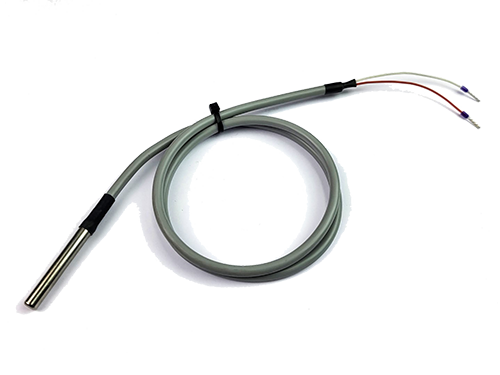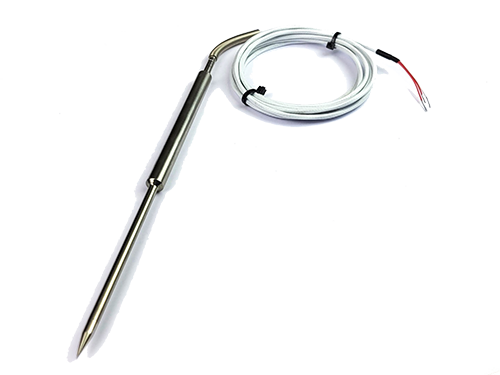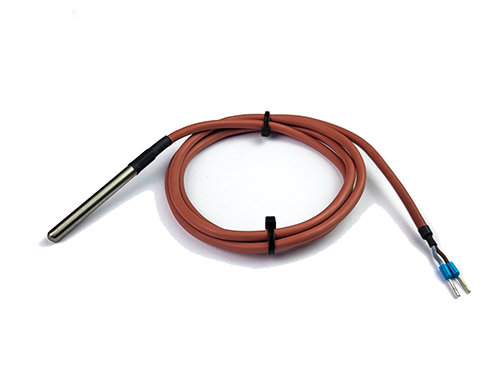Choose the right equipment for your needs
At EuroSensors, we understand how important it is to choose the right temperature sensor to ensure maximum precision and accuracy in temperature measurements. That's why we're here to listen and understand your unique needs. Our team of experts has over 10 years of experience in the field of temperature sensors and is here to help you find the best solution for your needs. We are committed to providing you with the highest quality materials and service from our wide range of products.
We pride ourselves on our expertise and commitment to our customers, and we are here to help you succeed in your industrial and production activities. We are convinced that our expertise and our attentive listening will allow you to make the most judicious choice for your company.

Conductive material
Polymer-carbon or Ceramic
Minimum temperature
-40°C
Maximum temperature
+200°C
How does a PTC probe work?
A PTC (Positive Temperature Coefficient) sensor is an electronic component that uses temperature variation to regulate the electrical current flowing through a circuit. These probes are often used to protect electronic circuits against overvoltage and overcurrent.
The PTC probe is made of a conductive material, such as carbon polymer or ceramic, which has an electrical resistance that increases with increasing temperature. Thus, as the temperature increases, the resistance of the PTC probe also increases, automatically reducing the current flowing through the probe. This protects the electronic components from damage caused by overcurrents.
PTC probes can be used in a variety of applications, including surge protection devices for computers and electronics, thermostats for appliances and safety devices for electrical equipment. They can also be used in charging systems for batteries, where they prevent overcharging by automatically reducing the charging current when the temperature becomes too high.
There are different types of PTC probes, each with different characteristics and performance. Low-temperature PTC sensors have a high resistance to relatively low temperatures and are therefore often used for surge protection applications. High temperature PTC sensors have lower resistance at higher temperatures and are therefore often used for overcurrent protection applications.
Why choose a PTC probe among other types of thermistor probes?
PTC (positive temperature coefficient) sensors are a type of temperature sensor that have certain characteristics that make them suitable for certain applications. Here are some reasons why a PTC probe might be chosen:
Positive temperature coefficient
Their resistance increases as the temperature rises, making them ideal for applications requiring thermal overload protection. For example, PTC sensors can be used to cut off power to a device in the event of overheating, which can protect the device’s components from damage.
Wide temperature range
PTC probes can be used over a wide temperature range, depending on the electrical and thermal characteristics, making them ideal for applications requiring a high temperature range.
Temperature stability
PTC probes tend to be very stable in temperature once they have reached their transition temperature, the temperature at which the resistance changes rapidly. This makes them ideal for applications requiring high temperature accuracy.
Integration in protection systems
They can be easily integrated into thermal overload protection systems, allowing them to be used to protect expensive equipment or systems from damage caused by overheating.
Low cost
They can be a little more expensive than NTC sensors, but they are generally cheaper than other types of temperature sensors, such as thermocouples.
Technical characteristics of a PTC probe
Type of probe : PTC (Positive Temperature Coefficient) probe
Conductive material : Polymer-carbon or Ceramic
Temperature range: From -40°C to +200°C
Temperature tolerance: From ±1°C to ±5°C
Resistance range: ± 0.5%, 1%, 2%, 3%, etc.
Tolerance of resistance : ± 5%
Temperature coefficient : PTC (Positive Temperature Coefficient)
Physical form: 3 mm diameter wire
Length : Consult us
Connectors : Screw or crimp connectors
Nominal voltage : 250 V
Rated current : Consult us
Usage: Overcurrent and overvoltage protection in electronic systems, surge protection devices for computers and electronic devices, thermostats for appliances, safety devices for electrical equipment.


Why choose EuroSensors?
European manufacturing
ISO 9001 certification
Manufacturer since 2010
Warranty and service
Expert advice
More than 240 customers in over 10 countries
Our other thermistors
NTC probe
Negative temperature coefficient resistors. Resistance decreases as temperature increases.
How to get a PTC probe?
Benefit from complete and quality services, from the definition of your needs to the delivery of your equipment.
At Eurosensors, we are constantly striving to provide our customers with quality, state-of-the-art products. Each expert in our factory attaches great importance to manufacturing products that meet our quality criteria, which have made our reputation for more than 10 years.
